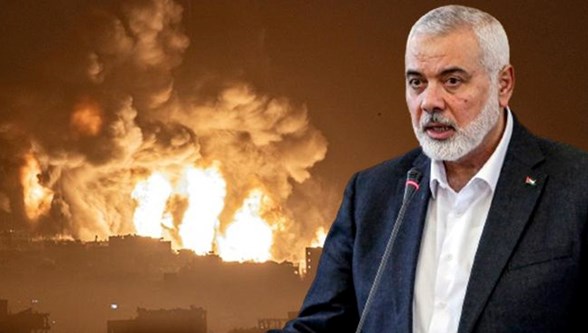Haniyeh was speaking at a symposium organised by the Forum for Strategic Thought in the Lebanese capital Beirut, where scenarios for an Israeli war in Gaza were discussed.
Haniyeh reminded that Hamas has put forward demands including “a complete halt to attacks, the withdrawal of Israeli forces, the reconstruction of Gaza, the exchange of prisoners and the provision of aid to the Gaza population,” and said, “These are our demands. Our people, the resistance forces and the Free People of Hamas are negotiating and we are open to any efforts to meet the demands of the resistance forces in the ceasefire negotiations,” he said.
Haniyeh said he approved the ceasefire plan presented by the Qatari and Egyptian parties on May 6, but that Israel wanted changes to the plan that would affect the substance of the resistance’s demands.
Haniyeh said Israel’s negotiation strategy was based on pressuring Hamas at the international and regional levels to accept Israel’s views, and said Israel had set a political trap by imposing certain conditions, without elaborating.
“Israel’s defeat is not a dream, it’s a reality”
Haniyeh said the Al-Aqsa flooding was a sign of new equations being drawn for the Palestinian issue and the region in general, saying:
“Three strategic results were achieved with the Al-Aqsa flood. First, the Palestinian issue, which had been removed from the agenda by some international and regional countries and presented as an internal Israeli issue, was put back on the agenda at the international and regional levels. Second, Israel’s defeat was a reality, not a dream. Third, while rifts were emerging within Israel, the Ummah is united on the Palestinian issue.”
Haniyeh added that the war in Gaza is a war that not only involves Israel, but also the United States and its Western colonial allies.
Indirect Negotiations Process Between Israel and Hamas
On May 6, Hamas told Qatari and Egyptian officials that it approved a ceasefire proposal, but Israel rejected it for not “fulfilling the conditions.”
U.S. President Joe Biden announced on May 31 that Israel had presented a new, three-phase ceasefire plan.
Biden said the proposal was Israel’s, but Prime Minister Benjamin Netanyahu said the war would continue until the “set objectives” were met.
Speaking to the parliamentary Foreign Affairs and Defense Committee on June 3, Prime Minister Netanyahu argued that there was a “gap” between Israel’s proposal and Biden’s.


